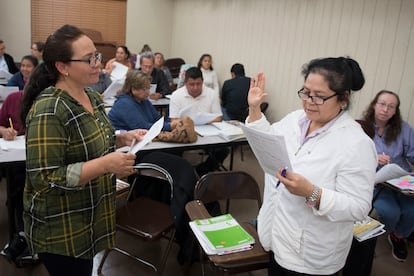US Citizenship Test: Questions, answers, and everything you need to become a naturalized citizen
The citizenship test consists of 100 questions about American government, history, and integrated civics, and applicants must answer six out of 10 questions correctly to pass

The U.S. Citizenship Test is an exam that foreign nationals must take in order to become naturalized citizens of the United States. But this is not the only requirement. People who want to become naturalized citizens must start a process with U.S. Citizenship and Immigration Services (USCIS), and meet a number of other requirements in addition to passing the Citizenship Test.
If you’re planning on applying to become a U.S. naturalized citizen, here’s all the important information you need, including documentation, the fees, and the questions in the U.S. Citizenship Test.
What documents do I need for the U.S. naturalization process
The main document you need is the N-400 application for the naturalization process. All applicants must send a photocopy of both sides of their Permanent Resident Card (“Green Card”), the check or money order for the application fee and the biometric services fee, and two identical color photographs with their name, and Alien Registration Number written in pencil on the back of each photo. You can check all the required documents on USCIS website.
How much does it cost?
The fee for filling a naturalization application is currently $640 dollars, plus the biometric services fee of $85, being a total of $725.
U.S. Naturalization eligibility requirements
According to USCIS, the most common path to U.S. citizenship through naturalization is being a lawful permanent resident (have a “Green Card”) for at least five years.
To be eligible for naturalization, you must be at least 18 years old and have been a permanent resident for at least five years. You must have continuously resided in the U.S. for the five years leading up to filing the application (if you are married to a U.S. Citizen, this may be three years), you must have been physically present in the country for at least 30 months during that time (18 months if you are married to a U.S. Citizen), and show that you’ve lived for at least three months in the state or USCIS district where you claim residence. You must also show good moral character, attached to the principles of the U.S. Constitution, speak, write and read basic English, pass a civics test, and take an Oath of Allegiance.
Recommendations
USCIS recommends bringing certified tax returns for the last five years (three years if you’re married to a U.S. Citizen). These may be ordered from the IRS. It also reminds applicants to submit photocopies of their Permanent Resident Card (Green Card). You will also need to bring it with a state-issued identification such as a driver’s license to your interview with USCIS.
U.S. Citizenship Test: Questions and Answers
The civics test to get the U.S. Citizenship is an oral test where a USCIS Officer will ask the applicant up to 10 of the 100 civics questions. The applicants must answer six out of 10 questions correctly (at least 60 of the 100) to pass the civics test.
It’s important to know that some answers may change because of elections or appointments. USCIS recommends ensuring you know the most current answers to these questions.
USCIS is aware that there may be additional correct answers to the 100 civics questions, but applicants are encouraged to respond using the answers provided in their guide.
The questionnaire is divided in the next sections: American Government, American History, and Integrated Civics. The first one (which consists of 57 questions) focuses on the principles of American democracy, with questions about the Constitution, the system of government, and the rights and responsibilities of American citizens.
The second part of the test (with 31 questions) covers American History, from the Colonial Period and Independence, passing through the 1800s (including the Civil War), until recent American History, with some questions about important historical facts.
The last part of the test, consisting of 12 questions. Some are about Geographical facts, about the U.S. Flag and National Anthem, and finally, two questions are about the National holidays.
Everyone who applies can see the list of questions and answers on the USCIS website.
If you have a medical disability that prevents you from demonstrating knowledge of the English language or civics test, you may not need to take those portions of the test. To apply, your doctor must complete Form N-648, Medical Certification for Disability Exceptions.
What happens if I fail the test?
If you fail any part of the U.S. Citizenship Test, you must retake the entire test at a later date. This could take between 60 and 90 days.
If you fail again, you’ll have to start the process from the beginning and present the N-400 form again. In these cases, it is recommended to ask for professional consulting to increase the chances of passing the test.
How long does the naturalization process take?
According to USCIS, the processing time for naturalization averages nine months, but it can take up to 11 months, depending on several factors.
Sign up for our weekly newsletter to get more English-language news coverage from EL PAÍS USA Edition
Tu suscripción se está usando en otro dispositivo
¿Quieres añadir otro usuario a tu suscripción?
Si continúas leyendo en este dispositivo, no se podrá leer en el otro.
FlechaTu suscripción se está usando en otro dispositivo y solo puedes acceder a EL PAÍS desde un dispositivo a la vez.
Si quieres compartir tu cuenta, cambia tu suscripción a la modalidad Premium, así podrás añadir otro usuario. Cada uno accederá con su propia cuenta de email, lo que os permitirá personalizar vuestra experiencia en EL PAÍS.
¿Tienes una suscripción de empresa? Accede aquí para contratar más cuentas.
En el caso de no saber quién está usando tu cuenta, te recomendamos cambiar tu contraseña aquí.
Si decides continuar compartiendo tu cuenta, este mensaje se mostrará en tu dispositivo y en el de la otra persona que está usando tu cuenta de forma indefinida, afectando a tu experiencia de lectura. Puedes consultar aquí los términos y condiciones de la suscripción digital.









































